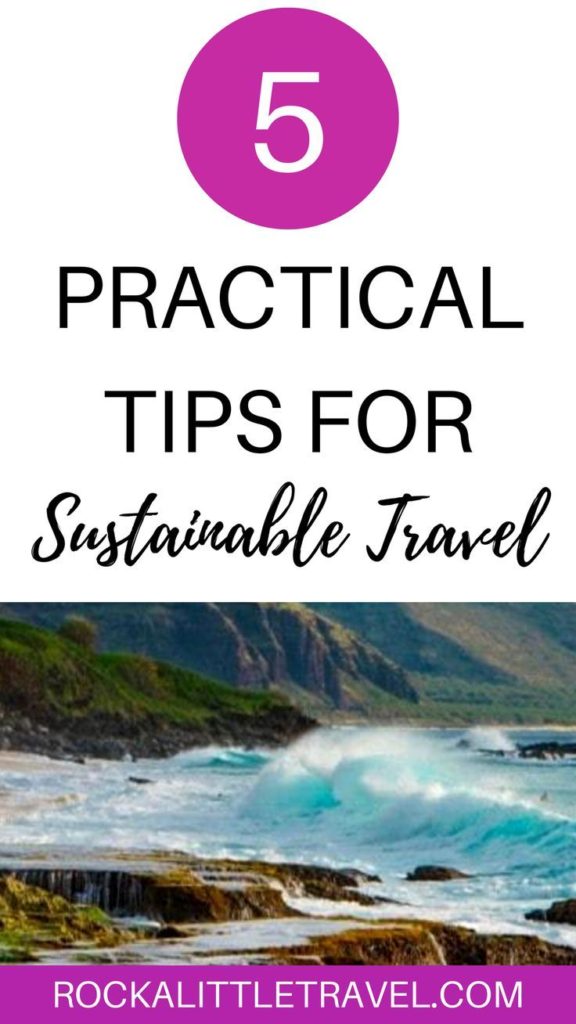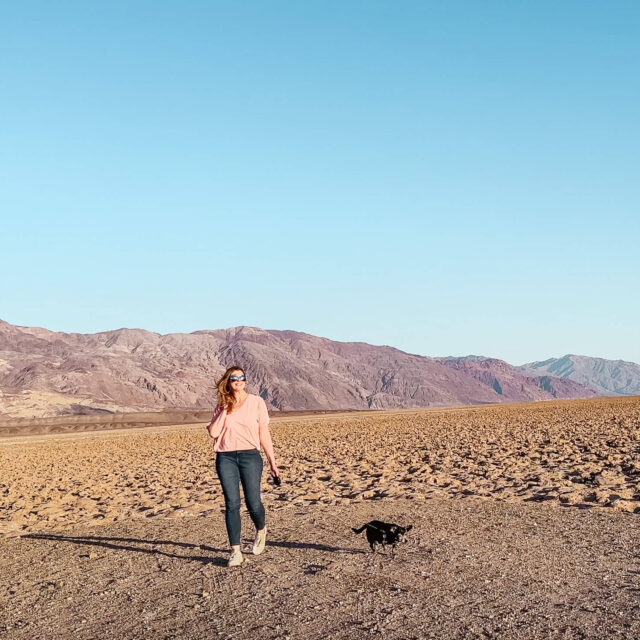
Responsible tourism has become more important than ever.
From reducing carbon emissions to prioritizing animal welfare, there are limitless opportunities and ways for us to improve the way we travel and reduce our impact on the planet.
The more I learn about the impact that travel has on our planet and the locations we visit, the more I want to make changes to address the problem.
We’ve been hearing a lot about over-tourism and how more people traveling leads to greater negative impacts on our environment. With that in mind, I’ve identified 10 ways to practice more responsible tourism and help you reduce your carbon footprint while traveling.
Some of the links in the post are affiliate links. If you make a purchase through these links it helps to support this site at no extra cost to you.
10 Tips for Responsible Tourism

These 10 tips for responsible tourism vary in their degree of impact and difficulty but I believe that even small steps in the right direction are necessary to get us where we want to go.
I also believe that committing to small changes can often lead to committing to bigger changes. In short, let’s all do the best we can.
If everybody is heading in the right direction, we’ll get there eventually.
Traveling Soon? Don’t forget your travel insurance.
- Travel insurance is now more important than ever.
- Travel insurance is probably less than you think it is. (Ex. For a week in Spain next month I’m paying less than $62.00.)
- Travel insurance covers a lot more than you think it does.
- It’s better to have it, than need it and wish you’d bought it.
- See for yourself. Check prices here.
1. Don’t buy bottled water

Of all the sustainable travel tips I mention, this has got to be the easiest for anyone to implement. I think the majority of people are aware that plastics are a real problem for our planet and our environment.
Hopefully, most of us are doing our part to begin reducing our consumption of plastics, especially single-use plastics such as water bottles. If you haven’t already, pick up a reusable water bottle from the store and take it with you when you travel.
You’ll save tons of money from this as well considering water bottles in the airport are going to cost you at least $5 each. There are even compact travel water bottles that fold or roll up for easy storage in your carry on bag.
Keep it empty as you go through the security of course, but once you’re in the terminal, fill up your water bottle at the water fountain.
You can find reusable and portable water bottles just everywhere.
2. Take public transportation

One of the best ways to travel in a sustainable way is to take public transportation as often as possible. Most major cities across the world, and especially in Europe, have excellent public transit systems.
In most cases, you can even get to your hotel from the airport by bus or train, within a reasonable amount of time. Taking the bus or train is also a much more affordable way to get around, especially when you’ve got all the other expenses associated with travel to deal with.
If you’re visiting a destination for the first time and are not sure how to get around on public transit, take a look at Rome to Rio to see what your options are.
Their search results include every form of transportation you can think of, and even include the prices for each option. Google Maps is also a great tool to use to see public transportation options when you’re on the go.
3. Eat less meat and more plants

This is one of my personal favorite tips for responsible tourism, though it can stir up some controversy now and then.
I know some people don’t like to hear this, but the less meat you consume, the better it is for the planet. In fact, many would argue that dropping meat and dairy from your diet may be the single biggest way you can reduce your impact on the planet.
While I’m not here to tell you what to eat, even just reducing meat consumption can help in big ways. Some have suggested reducing meat consumption to one meal per day, or even just abstaining from meat and dairy products one day each week.
It’s up to you of course, but the suggestion is there and the impact can be sizable. As an added benefit, veggies are good for you and typically come with additional health benefits.
4. Don’t buy so much stuff

The more stuff we buy, the more stuff is produced. This production increases deforestation, increases pollutants, and uses up more land. It also leads to more garbage ending up in the world’s landfills, because we know that eventually, that’s where all this stuff is going to end up.
Together, all of these things accelerate the impact of climate change. If we can collectively make the effort to reuse what we already have and buy less stuff, we can reduce or slow the impact of climate change.
We’ll also save a ton of money from not buying overpriced souvenirs.
5. Support local businesses

It goes without saying that when big corporations move in, small businesses often go out of business. This same pattern happens over and over again when new destinations become popular tourist attractions.
Once big business gets wind of the business opportunity, they put up shop and offer prices lower than the locals can afford to offer. Eventually, the local businesses are all gone and we’re left with far less authentic experiences.
More importantly, local families lose their source of income and many times, the ability to support their families.
Whenever possible, try to shop at local businesses when you travel. This includes if you’re buying gifts, going out for dinner, ordering cocktails, or booking a tour. All of these ways tourists spend money can help locals in the destination you’re visiting.
6. Ethical Animal Encounters

Responsible tourism also includes only engaging in ethical animal encounters.
Travelers should always avoid things like elephant rides, rodeos, or circuses, where it is well known that the animals are not treated humanely.
As a genderal rule, when you encounter wildlife, always be sure to give the animal plenty of space, do not touch them, feed them human food, or call out to get their attention.
Animals are not for your amusement, but can be enjoyed respectfully from a distance.
7. Respect the culture

If you’re an adventurous traveler, you will hopefully find yourself immersed in cultures completely different from your own.
When you do, be sure that you’re respectful when out in public and interacting with locals.
If you’re unfamiliar with the local culture of the country you’ll be visiting, do some research ahead of time. This way you’ll know what to expect and you’ll know how to to act to be polite.
8. Attempt to learn the local language

Another important part of responsible tourism is to make an effort to learn the local language.
No, you don’t need to study for days on end or try to become fluent, but learning the basics and some common words will go along way.
I’ve been to France a handful of times and I’ll be honest, my French sucks. But that doesn’t mean I don’t try. You should always try.
One of the best travel tips for Paris you’ll ever get is to always attempt the local langauge and always greet a shop owner in French as you enter a store. If you know the basics, this is easy to accomplish.
More often than not, locals will notice right away that you don’t speak their language well. They will often accomodate and switch to English (if that’s your language) but not always.
Sometimes you just won’t speak the same language as the person you’re trying to communicate with. Just roll with it.
9. Behave respectfully at all times

When traveling abroad (or anywhere really) behave in a respectful and polite manner at all times.
This means not yelling in the streets in the middle of the night, acting poorly after drinking too much, making rude comments to people in the streets, etc. I’ve seen all these behaviors during my own travels and I’ll tell ya, they don’t look good on anyone.
In short, always say please and thank you and always follow local rules and customs. If you do those things, you should be good.
10. Offset your carbon footprint

While we’re in the process of working to change habits and find more sustainable ways to get across our oceans, we can participate in Carbon Offset.
This is where we compensate for our emissions by funding an equivalent carbon dioxide saving elsewhere. If you visit Carbon Footprint, you can calculate the impact of your upcoming trip, and donate a small amount to a project to offset that footprint.
Typical projects include tree planting, community projects, and renewable energy. You can read all about the philosophy behind carbon offset and get more details about how it works at the Carbon Footprint website.
I hope you’ve enjoyed these 10 Tips for Responsible Tourism. If you would like to support this blog please consider sharing this post, it helps a lot. Thanks for reading.
Want to save it? Pin it.

Related Posts
Top 100 Highest Currency in the World in 2024
Photo by Canva This post will help you identify the top 100 highest currency in…
10 Travel Essentials for Women
These travel essentials for women are perfect for just about anyone planning a trip in…
10 Zero Waste Travel Essentials
Photo by Efetova This post may contain affiliate links. If you shop using these links,…

Eden Fite
Solo Traveler | Dog Lover | Avoider of CrowdsI help busy people find creative ways to travel more.


